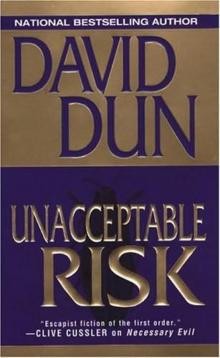Overfall sw-1 Read online
Overfall
( Sam Wintripp - 1 )
David Dun
David Dun
Overfall
One
The small jib was taut and straining in the northerly wind, the weather turning, the sky azure in the evening sun but for the near purple of the approaching dark clouds. To the east lay Tribune Inlet, a long fjord bounded by steep mountains and creating a great funnel that ended in a narrow, rock-walled passage called Devil’s Gate, where wind and water rushed, making dangerous work for sailors.
Before him, the sea was already starting to mound, as if little hands were forming humps in flattened dough. The whitecaps made logs and other debris harder to see, causing Sam to squint and stare over the bow of Silverwind, his custom-made, forty-eight-foot cruising sailboat.
There was the sound of parting water, and of spray falling back to the sea, the quiet thunder of wind in sail, the rise and fall of a gentle swell that underlay the chop, and a slight harmonic vibration as he drove the boat north and east to windward across the mouth of Tribune Inlet. The wind was unsettled, the barometer falling, but that was expected to change as a new high-pressure system built.
Sam wore yellow rubber sailing boots and athletic gloves for handling lines. The Farmer John rain gear featured pants so watertight he could sit in a puddle; a jacket with Gortex over goose down that blunted even the late October wind.
On the seat next to Sam stood Heraldo, known as Harry, Sam’s mostly Scottish terrier. It had been his son’s dog. Harry eyed Sam, and with a lip-licking expression, distilled his hunger into long swipes of his tongue.
“You’ve been saying that for an hour now.”
Harry repeated the long lick with innocent eyes. Sam then emulated him, running his own tongue around his lips, watching Harry’s canine eyes stare fixedly at the show. Harry lay down, his chin on his front paws, expressing pouting disquiet at Sam’s mockery.
The white-hulled boat-36,000 pounds of fiberglass, lead, and teak-floated featherlight over the sea. From his cushioned seat, Sam handled the wheel deftly with his feet, steering a straight course toward Quiet Bay, some fifty minutes distant.
Silverwind looked salty when compared to the vacation boats that jammed the big-city marinas and yacht clubs. It was loaded with the trappings of wilderness cruising: sheepskin on all the stays at the spars to protect the sails; dinghy and gas can lashed to the deck; netting on all the lifelines; canvas wind and spray breaks around the cockpit; solar panels; wind vane; a heavy-duty canvas and plastic windshield known as a dodger; a fold-away bimini top; and two diesel generators. The list of extras was formidable. After buying the Silverwind, Sam had spent another $250,000 preparing her to cruise.
There was nothing to this sailing on the so-called Inside Passage from Alaska to Victoria in summer except rocks and currents, intimidating to the uninitiated. The rocks made holes in boats and the currents from time to time made swirling holes in the water, aptly named whirlpools, and even more frightening, rolling waves called overfalls, created by the force of water meeting water at great speed in a narrow passage. A severe overfall could swallow a yacht in seconds sometimes swamping and sinking it, other times pounding it into slivers on the rocks.
The tides sluice the salt water in from the Pacific Ocean through the Queen Charlotte Straits behind Vancouver Island and between the smaller islands and up into the inlets, bays, and estuaries. Wherever the land constricts the flow of tidal water, the current races. In a few places the water moves like a white-water river, and boats dare not cross it during the tidal surge.
The spring tide was ebbing and the sea was tugging Silverwind toward Devil’s Gate, where the current on occasion reached a solid seventeen knots, one knot faster even than the infamous Nakwakto Rapids at the mouth of Seymour Inlet to the north and at least two knots faster than the Skookumchuck to the south. Last Sam heard, the Skookumchuck had killed sixteen people, and Devil’s Gate was way ahead of that, having eaten ten in one summer when a large yacht wandered down her throat and slit its belly on the rocks.
On one occasion Sam had seen a Devil’s Gate whirlpool pull down a telephone-pole-sized log, then free it, to burst to the surface three hundred yards down current with such force that it shot for the sky like a breaching whale. Devil’s Gate wasn’t a place to make a mistake, but it intrigued Sam and he had his binoculars ready to take a look at the overfall that would be created by this ebb tide. On a few rare days when the wind swung from the northeast in a roaring williwaw, it stiffened the overfall at Devil’s Gate to heights normally not found on sheltered waters. Some said it reached fifteen vertical feet and stood nearly straight like a concrete wall. Today was becoming one of those days, with the dark of the clouds and the blustery winds coming ever closer. Williwaw was a winter phenomenon not uncommon in late October. It referred to times when weather conditions in these water-filled canyons drove the winds to near-magical speeds. The natives said the word with a hint of reverence.
Down through the companionway door stood two screens-one radar and one GPS. The GPS was an electronic map showing islands and channels enhanced by a satellite signal that could depict the precise location of the yacht, while the radar painted an outline of the surrounding shores. Sam had noticed the drift in his course and continuously corrected.
His current course would take him abeam the opening where he would turn toward Devil’s Gate for a quick look before he did a 180-degree turn to escape the cold-eyed rock walls that sucked the sea through and into the small passage between North and South Windham Islands.
As the wind tousled his hair he slipped into a familiar reverie, in which the rushing of water and wind and the vibrations through hull and sail functioned like a sniff of good food or the sound of enticing music. It drew him. In sailing, as in most areas of his life, Sam was a purist If the wind blew, he traveled; if not, he sat, except in dire circumstances such as when he was running out of Cuban tobacco leaves for a good cigar and he needed to get to the appointed mail stop.
He was looking forward to dinner and an anchorage that was almost Zen-like in its serenity where he could sit out what felt like a building williwaw. When beating to windward, as he was now, there was no competing with the lift offered by the big diesel, but he wouldn’t use it. What he took from the wind was too important to him. It caressed his face, fed his spirit, shivered the boat through the mast, dampened the roll-a thing in harmony with the earth and not a thing in opposition.
Besides her seaworthiness, Silverwind offered something just as important to Sam. He could pull her into a harbor and not be noticed, not a single eye turning his way. If he had chosen a hundred-foot international yacht the same could not be said. Although beautiful in her lines and certainly in her abilities, Silverwind was close enough to ordinary to suit Sam’s purposes.
Sam was a long-muscled swarthy-skinned man who stood all of six feet two inches in his stocking feet, part Tilok Indian, handsome with curly dark hair that fell down over his ears. His face was more angular than round, with fine features, smooth and unblemished except for two scars, one over his right eye maybe a half inch, and a small nick at his chin. His eyes were amber.
Since his retirement he had taken to wearing a gold earring in his left ear. Around his neck, usually out of sight, he wore a braided rawhide necklace with turquoise stones and a golden sun locket the size of a half-dollar. When it had belonged to his grandfather, the picture in the locket had been of Sam as an infant. Now the picture was of his grandfather, Stalking Bear, in ceremonial regalia at the annual gathering of the new beginning. His grandfather had said about Sam that he had a look of eagles in his eye. Whether it was there or not, Sam had a strong personal presence that he had learned for professional reasons to disguise. Usually he sailed in a raffia hat
and sunglasses but wore his work clothes, a loose pullover shirt and simple pants-again by design, nothing to call attention and nothing memorable.
Sam’s ultimate destination of the moment was Sydney, BC, just across from Vancouver. He’d have dry dock repairs made while he wintered in the mountains of California, where he would feed his soul. After that perhaps he would come back to this watery evergreen wilderness or maybe head to the South Seas. Sam no longer made plans more than a few months ahead.
Looking along the rock faces that bordered the entrance to Devil’s Gate, he focused on the sharp tide line where the salt water had killed the small evergreens, as if some giant made a regular trimming. Farther along toward the pass itself the rocks were gray black, steep, and treeless, although every little ledge seemed to harbor a scruffy green bush or two. Maybe he would get a good look at the overfalls. A camera with a 300mm lens sat on the seat next to him but the light had faded too much for a photo. Using binoculars, he studied the wave. It was awesome. By itself it would never sink a blue-water boat, but by deflecting them into the whirlpools and finally the rocks, it broke and sank even oceangoing yachts with ease. He came about, knowing it was time to escape the current, bringing the nose into the wind, then settled into another broad reach back in the direction he had come.
As he reveled in the wildness of this place, his eye caught movement. It appeared to be a woman, running on a narrow trail that traversed the face of the treeless portion of so-called Eagle Bluffs of South Windham Island near the island’s sharp point.
“Go figure,” he said to the terrier.
There weren’t many tourists in this part of BC in October. South Windham Island, as far as he knew, had no residents, no government parks, and no resorts. At least none showed on the chart.
Harry barked in response to Sam’s concern.
Two
Hurrying but purposeful, Anna Wade slipped on her tennis shoes, took nothing but the computer CD-ROM entrusted to her by her brother, her considerable wallet, and her satellite phone, all of which she stuffed in a waterproof bag that went into her fanny pack. The seaplane would meet her on the backside of the island in an hour and a quarter, but there might be a long wade to reach the plane as there was no dock.
When she walked up the trail away from the lodge she felt as if someone was watching. She knew she was rattled and perhaps imagining things. Normally she felt freed, calmed, by this wild place, even the shivers of isolation and the creatures casting wary stares. Today instead of wonder she felt fear.
She tried to tell herself that a major company would not be committing murder, but at this point, alone on this island, she couldn’t come to any conclusions. As she jogged past their pen the rotweillers’ ugly snarls caused her to pick up her pace.
Soon she found herself running on the forest trail just above the steep shoreline headed toward the large cliffs-the long route to Langley Bay on the opposite side of the island. It would be less obvious if she didn’t take the direct route. The dry leaves of October made the forest noisy and her passage through it anything but a secret. After several minutes, she stopped. She thought she heard a snap above the wind sound a little distance back, perhaps a footfall breaking a stick. More sounds came-maybe something moving behind her along the brushy trail.
It stopped and she could feel it listening. Or was it just the wind? She bolted and ran. If they discovered that she was sneaking off to a seaplane, the fear now crouching in her mind might become reality-an outright confrontation with Roberto or worse. They might let the dogs loose.
She was in good shape and thought she had a good chance of outrunning them. Unless they brought the dogs.
As if summoned by the thought, she heard the snuffling and yelping of hounds eager for blood. Anna’s stomach knotted and her throat tightened. Ahead ran a nearly invisible path that eventually cut across the middle of the cliff. Although she had never taken it, she had seen where it emerged from the tree line. The cliffs were one place where she might face an attack dog and win.
Quickly she jumped off the main trail and scrambled down the hill toward the water. It was much steeper than she imagined but the dense brush made her feel safer. The forest, shades of green above her and choked with huckleberry, salal, and salmon berry, grew like a wall. Adrenaline made her gut hollow and her body light. Suddenly it occurred to her that it would be easy for someone to force an accident on these cliffs.
Uncertain, she stopped. Maybe she should fool with the satellite phone. But what could anyone do? First she would get distance between herself and any pursuer.
Her heart was pounding and her breaths were deep and hard. She tried to listen, but heard only herself and the wind. She supposed that a person on the cliff trail would make an easy target.
Again she ran. She could not go back, and going upslope would be impossible without slowing greatly and releasing a cascade of stones and creating the crackles and snaps of walking in a dry forest.
After what seemed a few desperate strides around a corner the trees gave way to the vertical drop. It was a couple hundred yards to more forest. She paused and wiped the sweat from her eyes.
Then Anna saw the sailboat throwing spray in the whitecaps, its sails looming and its sleek body, and the man at the helm. She glanced down at the whirling of the bending water green like moss on marble headstones, strong enough to move a train, sufficient to drown an army. The boat shined at her like mock salvation, a world away below her.
As Sam watched her try to sprint on weary legs, the trail collapsed. Dirt, rocks, and the woman plummeted into the water. Glancing at his chart, then at the GPS, he knew that she might have fallen into the current.
Sam took a deep slow breath, and flipped off his hat, angry that this was happening to him. Harry barked in earnest now. Meaning to take a better look, Sam once again came about, heading back down into Devil’s Gate. On a broad reach the boat shot ahead, requiring that he completely luff the main. He had seconds to decide. The wind was still increasing and driving the black clouds overhead.
Always things went wrong in multiples.
With the mainsail flapping he knew he was about to attempt a nearly hopeless rescue. It would be a regression into his old life-a life he had forsaken.
He punched a button to furl the main inside the mast. Incredibly, the sail bound and it stuck. Never in a whole year had the mainsail furling jammed and now when he needed it to work-it didn’t. He cursed gadgets and reversed the process. Fortunately the bind came free and it unfurled. Not wanting to waste precious seconds, he released the halyard, ran forward, and yanked with all his weight to pull the big sail down. It piled on the boom in a sloppy mess.
Out of habit his mind calculated the odds of survival-his own and hers. This area was a wilderness with an occasional passing yacht or commercial boat. The instant she hit the fifty-five-degree water she would be swept away, probably dragged under by a whirlpool, and if by some miracle she did not drown in that fashion, she would be dead in three or four minutes when she was pulled into the overfall and then buried by the huge whirlpool underlying it, down thirty or forty feet under the sea with little hope of making it to the surface in time to breathe. And if somehow she did struggle to the surface, she’d probably die from cold shock before she could swim to shore. Her only real chance was climbing onto a dry rock or making it to a tiny pocket of beach.
While he started the motor and ran down the channel he looked for some sign of her. Normally he’d have left himself a spot of mainsail to steady the boat. With the main down the boat set up a roll.
He waited for the next piece of bad luck.
His eye caught the white of her shirt against a rock. Glancing at the GPS, he realized he was being drawn toward the pass, but there was still time to escape the current. Quickly he looked with binoculars. Even with the boat’s motion he could tell that she clung to seaweed-covered granite. She was well away from the cliffs and the point from which she had fallen. From her location it was too far to swim to sh
ore in this current.
For just a second his eyes left the figure in the water to look for another boat-any boat. Nothing.
The wind was increasing fast, blowing right at the overfall. He knew the result: It would push the wave up, perhaps making it half again as high.
He pondered whether he could save her. He loved his yacht as much as a man could love a material thing and still possess a soul. He loved Harry. If he went much closer he would risk losing Harry and the boat, maybe dying, and for a stranger who would probably drown anyway.
Then he saw the solitary figure on the trail from which the woman had fallen. He breathed a sigh of hope. There were two dogs running, noses down, barking their frustration at the cliff and the vanished track.
Through the binoculars he managed to get a shaky view of a man standing, looking down into the water, and then turning to walk away.
She was waving frantically, but at Sam, not the man on the cliff. The man didn’t run or even look agitated. Assuming that he saw her, he plainly didn’t care if she died. Perhaps he even wanted her to die. A moment later he had disappeared.
“Unbelievable,” Sam said aloud.
With the wind the sea was building fast and the waves were washing over her. She would be swept away in minutes. Glancing at the wind indicator he saw the wind at thirty-five knots and building. It was going to be a williwaw.
He brought the boat around into the wind and furled the jib, then ran to the wheel and concentrated on positioning the boat. Because he was upstream from the woman, the current, the wind, and the breaking sea were sweeping him toward her. With the sails down the boat rolled even worse in the building chop. He added power.
According to the GPS, the current was pushing him at seven knots over the bottom. Sam was accustomed to risking his life, but there was still an adrenaline surge.

 Overfall sw-1
Overfall sw-1 Unacceptable Risk
Unacceptable Risk At The Edge
At The Edge Unacceptable Risk sw-2
Unacceptable Risk sw-2 Overfall
Overfall The Black Silent
The Black Silent